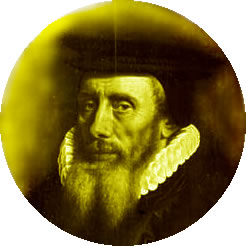January 03, 2007
The envelope, please
 In the larger auditorium at Language Log Plaza, Geoffrey Nunberg, secretary-general of the Goropius Becanus Prize Committee, stands at the podium. As the audience falls silent, and 16th-century Antwerp guildhouses are projected on the screen behind him, Nunberg reads from the Wikipedia:
In the larger auditorium at Language Log Plaza, Geoffrey Nunberg, secretary-general of the Goropius Becanus Prize Committee, stands at the podium. As the audience falls silent, and 16th-century Antwerp guildhouses are projected on the screen behind him, Nunberg reads from the Wikipedia:
Johannes Goropius Becanus (1519-1572) was a Dutch physician, linguist, and humanist. He was born Jan Gerartsen in the town of Gorp, situated in the municipality of Hilvarenbeek. As was the fashion of the time, Gerartsen adopted a latinized surname based on the name of his birthplace, Goropius being rendered from "Van Gorp"' and Becanus referring to "Hilvarenbeek."
He studied medicine in Leuven, and became physician to two sisters of Charles V: Marie and Eleonore, who were based in Brussels at the time. Philip II, the son of Charles V, wanted him also as his doctor and offered him a rich income. Goropius refused and established himself as medicus (town doctor) of Antwerp in 1554. Here, free of courtly intrigues, Goropius dedicated himself completely to the study of languages.
Goropius dedicated himself to studying antiquity during this time, and became fluent in many languages. Goropius theorized that Antwerpian Flemish, or Brabantic, spoken in the region between the Scheldt and Meuse Rivers, was the original language spoken in Paradise.A corollary of this theory was that all languages derived ultimately from Brabantic. The Latin word for “oak,” quercus, Goropius derived from werd-cou (“keeps out cold”); the Hebrew name “Noah” he derived from nood (“need”). Goropius also believed that Adam and Eve were Brabantic names (from Hath-Dam, or “dam against hate"; and Eu-Vat, “barrel from which people originated,” or from Eet-Vat, “oath-barrel,” respectively). Another corollary was the placement of the Garden of Eden itself in the Brabant region. In the book known as Hieroglyphica, Goropius also proved to his satisfaction that Egyptian hieroglyphics represented Brabantic.
Leibniz, himself no stranger to strange ideas about language, is said to have recognized the transcendent quality of this work by coining the French verb goropizer ("goropize") to mean "invent absurd etymologies". So it's fitting that in honor of Dr. Goropius Becanus, an anonymous benefactor has endowed the prestigious Goropius Becanus Prize, awarded to people or organizations who have made outstanding contributions to linguistic misinformation.
As you can imagine, the list of nominees for the first Goropius Becanus Prize (or "Becky" for short) was a long one. Nevertheless, the committee was able to reach a unanimous verdict, which Nunberg will announce today at 12:00 p.m. ET on Fresh Air. Tune in then to learn who won (though it's rumored that an advance text of Nunberg's speech has been leaked).
Some background on likely contenders is available from these Language Log posts:
The BBC: "Parrot telepathy at the BBC"; "The most untranslatable word"; "Tudor linguisic homogeneity"; "The Agatha Christie Code: Stylometry, serotonin and the oscillation overthruster"; "Sad knights who say nü"; "It's always silly season in the BBC Science Section"; "Vicky Pollard's revenge".
Dr. Leonard Sax: "David Brooks, cognitive neuroscientist"; "Are men emotional children?"; "Of rats and (wo)men"; "Leonard Sax on hearing"; "More on rats and men and women"; "The emerging science of gendered yelling"; "The vast arctic tundra of the male brain"; "Girls and boys and classroom noise".
Dr. Louann Brizendine: "Neuroscience in the service of sexual stereotypes"; "Sex-linked lexical budgets"; "Sex and speaking rate"; "Yet another sex-n-wordcount sighting"; "The main job of the girl brain"; "The superior cunning of women"; "The laconic rapist in the womb"; "Open-access sex stereotypes"; "David Brooks, neuroendocrinologist"; "Gabby guys: the effect size"; "Every 52 seconds": wrong by 23,736 percent?"; "Two new reviews of Brizendine"; "Word counts"; "Sex differences in "communication events" per day?"; Busy tongues".
Paul J. J. Payack: "986,120 words for snow job"; "Hackery, quackery, schlock"; "Say anything".
[In this connection, I'd like to draw your attention to a post from the Homeric era of blogging (Language Hat, "Beginnings", 7/31/2002), where Jim Bisso comments that "The sad thing about Goropism is that within it lie the seeds of the evil nexus of nationalism, racism, and linguistic chauvinism." You could turn that comment into a terrific book on the Dark Side of the enlightenment.]
[Update -- Alex Baumans writes:
As a native of Leuven, and hence speaker of the Language of Paradise, I'd like to commend you on the excellent choice of patron for the Language Log Prize. In the version I heard way back at the university, Becanus pointed more specifically to the dialect of Antwerp as the direct descendant of Edenic. Given the generally good opinion the inhabitants of Antwerp have of themselves (they refer to Antwerp as 'De Metropool' or 't Stad', rather like ancient Roman 'Urbs') we found this very typical.
On rereading the Wikipedia article about Becanus, I would venture that that it was written by a compatriot, probably from Dutch Brabant. He carefully avoids every mention of Flemish and accurately describes the language as Brabantic. While in Belgium the term 'Flemish' has come to mean the variants of Dutch spoken there, it is, strictly speaking, a separate dialect (and a quite incomprehensible one at that, made up principally of laryngal fricatives and glottal stops). On the Dutch side of the border, there is no such confusion. An inhabitant of Noord Brabant wouldn't dream of saying that he spoke Flemish, let alone that Adam and Eve spoke it.
I believe that Dr. Goropius Becanus himself called it "Cimbrian", which he derived from the name of Gomer, son of Japeth. Before the pronunciation was corrupted by the Hebrews, of course. By a curious coincidence, "Gomer" has become American slang for a person of certain characteristics, derived (I suppose) from Gomer Pyle of the Andy Griffin show.]
Posted by Mark Liberman at January 3, 2007 08:20 AM